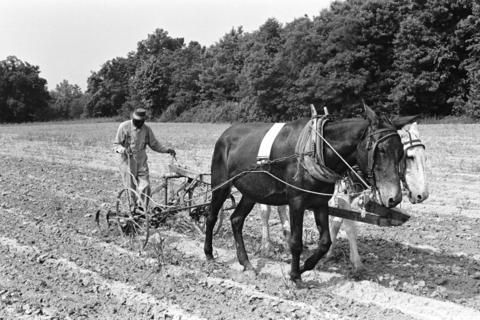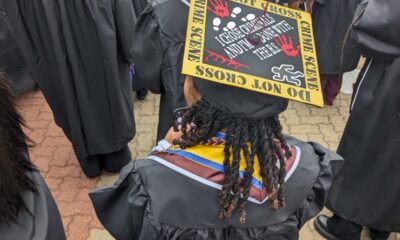Culture
Why Talking About Field Order 15 at the Fourth of July BBQ Matters

Until she became a teenager, Mamie Smith had to pick cotton, pecans and peaches before and after school in Griffin, Georgia. She was a sharecropper’s daughter.
For many black people, sharecropping chained them to farms under the guise of hiring them. They worked the fields and gave the landowner a percentage of the money made when the crops were sold. In the end, they were often indebted to the landowners and that debt had to be worked off before they could leave that employment.
But for Smith’s family it was different. In the 1900s, her family acquired the land they had worked from the owner who was believed to be Smith’s grandfather. For them, it was a form of reparation, said Smith’s son, Dr. Ken Harris. Still, he knows their story is unique.
“Reparation is something black people were due, but never did see and never will see,” Harris said.
Making the Case
Dan Moore, owner of Atlanta’s black museum, Apex, agreed. “They have no intention of fulfilling the promises they made,” he said. “All men are created equal as long as they are white and they are men.”
Still, the demand for reparation recently gained momentum and resulted in the House of Representatives which held its first Congressional hearing on reparations on Juneteenth, the cultural celebration to mark the summer day in 1865 when slaves in Texas learned they were free.
The hearing included high-profile testimony from actor Danny Glover, U.S. Senator Cory Booker and author Ta-Nehisi Coates, who in 2014 wrote an article, “The Case for Reparations,” for The Atlantic.
They presented their cases: centuries of slavery, decades of Jim Crow, and ensuing years of discrimination and oppression have ensured that black people in the United States were subjected to a relentless campaign of terror. It’s seen in police brutality and the disproportionate number of blacks in prison. It’s seen in redlining and racist G.I. bills, vagrancy laws and debt peonage.
“Scholars have presented the issue as a way of removing the stain of slavery, Jim Crow, and their continuing consequences, and as a way of absolving the country – and in some cases corporations – of the debt owed to blacks, according to Adjoa A. Aiyetoro, a law professor at the University of Arkansas and author of the paper, “Why Reparations to African Descendants in the United States Are Essential to Democracy.”
But reparation isn’t about making white people feel better. “The benefits whites received from slavery and its brutality, Jim Crow, and the continuing worse treatment afforded blacks in every major dimension of life including employment, health care, and the criminal punishment system, must be eliminated,” Aiyetoro said.
Black people are still suffering from the effects of slavery, Moore said. It’s still seen in the disparities with bank loans, buying property, and obtaining a proper education.
Aiyetoro said wealth inequality has been structured over many generations through the same systemic barriers that have hampered blacks throughout America’s history: slavery, Jim Crow, so-called de jure discrimination, and institutionalized racism.
Early Instances of Reparation
Belinda Royall was kidnapped from her home in modern-day Ghana and sold into slavery. For 50 years she endured enslavement at the hands of Isaac Royall and his son. Then in 1783, Belinda Royall, now a freedwoman, petitioned the commonwealth of Massachusetts for reparations and won.
Royall, who was illiterate, won $1,500 a year, said Ray Winbush, author of “Should America Pay?” and member of the National Coalition of Blacks for Reparation in America (N’COBRA). But she kept having to appeal and only successfully received reparation for three years, Winbush said.
Still, the first recorded demand for reparation came during slavery from David Walker, a free African, according to Aiyetoro. In his book, “David Walker’s Appeal,” Walker demanded that slave owners, their facilitators and apologists end slavery and provide some recompense for enslavement.
“The Americans may say or do as they please, but they have to raise us from the condition of brutes to that of respectable men, and to make a national acknowledgement to us for the wrongs they have inflicted on us,” Walker wrote.
Black reparations were actively considered and often effected, Coates wrote in his article. Quakers in New York, New England, and Baltimore made “membership contingent upon compensating one’s former slaves.”
In 1782, the Quaker Robert Pleasants emancipated his 78 slaves, granted them 350 acres, and later built a school on their property and provided for their education, according to Coates.
Edward Coles, a protégé of Thomas Jefferson who became a slaveholder through inheritance, took many of his slaves north and granted them a plot of land in Illinois, Coates wrote. John Randolph, a cousin of Jefferson’s, willed that all his slaves be emancipated upon his death, and that all those older than 40 be given 10 acres of land.
As the northern troops moved through the South, some of the military officials decided they had to do more than free people, according to Katherine Franke, author of “Repair: Redeeming the Promises of Abolition.” They had to do something to make their freedom meaningful. The newly freed were poor, uneducated, sick and suffering from the trauma of slavery. They had endured rape, torture, family separation and violation of their fundamental human rights.
They decided on reparation in the form of land, Franke said. By then, many of the plantation owners had fled. And the military officials gave their lands to the owners’ former slaves. It was a black utopia, Franke said.
“Black people could heal,” she said. “They could know what it meant to finally have some form of safety and control.”
But Field Order 15 that General William T. Sherman issued, which gave freed Africans “forty acres and a mule,” was short-lived, Aiyetoro said.
Franke said two years later, white people got back their lands and the black people were then forced to enter into a labor contract.
“That’s what freedom ended up looking like, a new form of slavery and they are still feeling it today,” Franke said. “Formerly enslaved people were free, but not free in the sense that they could steer their own lives.
“They didn’t have the resources. They were forced to enter into year-long labor contracts, in many cases for the exact same people who used to enslave them.”
Today, white people have 12 times the accumulated wealth compared to African Americans. And most of the wealth came from real estate, which was denied blacks, Franke said.
Franke, whose family originated from Germany and England, admitted her family benefited from America’s white supremacy, which made slavery possible.
Modern Examples of Reparation
Institutions and corporations also gained wealth on the backs of black people. In 2005, Wachovia apologized for its ties to slavery and in the same year J.P. Morgan Chase & Company also apologized and established a $5 million scholarship program for black students.
After revelations surfaced that Georgetown University sold hundreds of enslaved laborers in 1838 to keep the university afloat, its students took action.
In April, undergrads voted to tax themselves the symbolically significant amount of $27.20 per semester to create a fund that will support the descendants of the 272 enslaved people from whom the university profited.
“It was supposed to be a Catholic university. They were supposed to have a vow of celibacy, but the priests raped the black women and sold their children to keep the University afloat,” Winbush said.
Princeton Theological Seminary last year released a report describing its founders’ and early faculty’s ties to slavery, according to The Washington Post. Now, some of its students want the school to provide reparations for its role in the slave trade.
Roads to Reparation
Ten years ago, when Franke began working on her book, no one was talking about reparation. Reparation is not just relevant to black people, but all of us,” Franke said. “It’s our history too.
White people have a responsibility for this history. It affects us too. For us to be free of that history means we have to take responsibility for it. We’re responsible for repairing that history.”
Aiyetoro said despite America’s definition of its democracy, it has lied about the presence of democracy because of the oppression and exclusion of black people. African descendants’ struggle for civil and human rights is a struggle for the realization of democracy, Aiyetoro said.
“America will never be America until it pays reparation to black people,” Winbush said. “America has always lied about itself. There has never been a time when it told itself the truth and it continues to lie.”
Winbush said reparation could be $100,000 and a one-way ticket to Africa. Other supporters suggest the government establish funds to provide for education, community development and other supports for African descendants.
Franke said the government could revise estate tax, collect it and place it in a trust to be administered by leaders of the black community. That money would then be distributed to help those who can’t afford housing.
Other demands include programs that end discrimination in health care and the elimination of disparities in the penal and financial system. Reparations paid to African descendants for the massacre in Rosewood, Florida in 1923 included the development of a scholarship fund for “minorities” and the creation of a fund for Florida A&M to continue research of this historic event, Aiyetoro said.
“Reparations are not an attempt to “equalize” African descendants’ resources with whites but to estimate the value lost and restore that value or an approximation of it to the injured group,” Aiyetoro said.
Aiyetoro went on to list examples of reparations that would repair the injury and mend the damage caused by government action or inaction including the creation and continuation of the myth of white superiority and black inferiority.
She said a significant amount of money should be given, much like that given to Japanese-Americans interned during WWII, to every African who is a descendant of an enslaved African or who suffered through Jim Crow.
She said trust funds should be developed to fund African descendants for: education, housing, healthcare for uninsured African descendants as well as training of medical professionals, law enforcement and other state-certified providers in identifying unconscious racism and ways to combat it.
The funds would also be used for ending felony disfranchisement laws that lead to the disparity in sentencing, research on the continuing consequences of slavery and Jim Crow, and the revision of books provided for public education to include the perspective of African descendants in the telling of the history of slavery and Jim Crow and its continuing consequences.
But Apex’s Moore is not optimistic.
“If anything does happen, white people will sit with what they call black leaders and hammer out some agreement to satisfy some people,” he said. “But it won’t be far reaching.
Under the table, they will sign off on a deal that will benefit a few people, but not benefit those who really need it.”

-

 Featured10 months ago
Featured10 months agoCalifornia Is the First State to Create A Public Alert for Missing Black Youth
-

 Featured10 months ago
Featured10 months agoAfrican American Leaders Stay the Course Amid Calls for President Biden To Bow Out of Race
-

 Featured10 months ago
Featured10 months agoThe Debate Fallout Lands on Both Candidates
-

 Featured10 months ago
Featured10 months agoPresident Joe Biden Decides to Withdraw from the Presidential Race
-

 Featured10 months ago
Featured10 months agoPresident Joe Biden Describes Shooting of Donald Trump As ‘Sick’
-

 Featured10 months ago
Featured10 months agoIn One of His Final Speeches as President, Biden Says It’s Time for ‘Fresh Voices’









